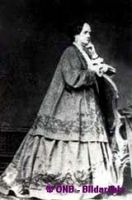Karoline von Perin-Gradenstein
Karoline von Perin-Gradenstein was a pioneer in fighting for women’s rights, an engagement for which she sacrificed her fortune and her happiness.
Karoline von Pasqualati descended from a rich aristocratic family. At the age of 18 she got married, within her social class, to Baron von Perin-Gradenstein und gave birth to three children.
Her husband died, and she got to know Alfred Julius Becher, a democrat, music critic and publisher of the journal „der Radikale“ and fell in love with him. The couple lived together without being married, which at that time caused scandal in aristocratic as well as in bourgeois circles.
Inspired by the democratic ideas of her partner, Karoline von Perin started to campaign for equal social and political rights for women. It was in the year of revolution, 1848, when she founded the „Viennese Association of Democratic Women” (28 August); it was the first women’s association of Austria with a clearly political attitude. Her courageous action was the response to the violent suppression of a demonstration of Viennese female workers. The objective of this association was to support the liberal-democratic movement of 1848 and to disseminate its ideas. The constitutional assembly in the Vienna city park “Volksgarten” was stormed by angry men and turned into a disaster; it had to be interrupted and continued in a different venue. The women that participated in the assembly were defamed in the media which were dominated by men. Karoline von Perin was insulted as a „dirty amazone“, „political pitch-woman“ and as „unfeminine concubine of a demagogue”.
In October 1848 revolution was put down with great violence, martial law was declared, and all kind of political activities, including those of associations, were defined illegal and therefore prohibited. In this context, the „Viennese Association of Democratic Women” was closed down after only 2 months of activity.
With her democratic ideas, Karoline von Perin was much ahead of her time. Therefore she was not at all supported by upper class women. This was the beginning of Karoline von Perin's fall from grace and her exclusion from the bourgeois world.
Both her and her partner were betrayed and put into prison. Julius Becher – as many other revolutionists was executed without trial. Karoline von Perin was put into police custody and heavily mistreated. All her property was confiscated, legal custody for her three children was removed. She was declared to be mentally ill, which was an effective and often adopted method to put insubordinate rebellious women in their place.
At last she managed to flee from Vienna and went to Munich, at that time exhausted, under psychological pressure and without any financial resources.
„In the eyes of many people she got what she deserved for her denial of the natural character of sexes.”(Hauch, Frau Biedermeier auf den Barrikaden.)
Later Karoline von Perin tried to return to Vienna, it can be assumed that she hoped to get back legal custody for her children. It is unknown if she succeeded in this. She was able to return to Vienna, at the price of withdrawal of her former political claims; she had to distance herself from any kind of revolutionary engagement.
Back in Vienna, she founded a placement service which barely enabled her to earn her living without being totally dependent from her family. After that, all traces of her vanished.
It was the bitter end of courageous woman who had left behind her aristocratic origins, so that she was free to dedicate herself to the fight for women’s democratic rights.
Sources:
- Wiener Stadt und Landesarchiv:
http://www.wien.gv.at/kultur/archiv/geschichte/zeugnisse/frauenverein.html - Research data base Ariadne: http://www.onb.ac.at/ariadne/vfb/bio_perin.htm
- Hauch, Gabriella: Frau Biedermeier auf den Barrikaden, page 158, 1990, Verlag für Gesellschaftskritik
Photocredits: Karoline von Perin, author unknown,
Sources: Picture archive ONB PF 8595:B(1), NB 536.595, with friendly permission of ONB ((Austrian National Library) of 20.01.2014




